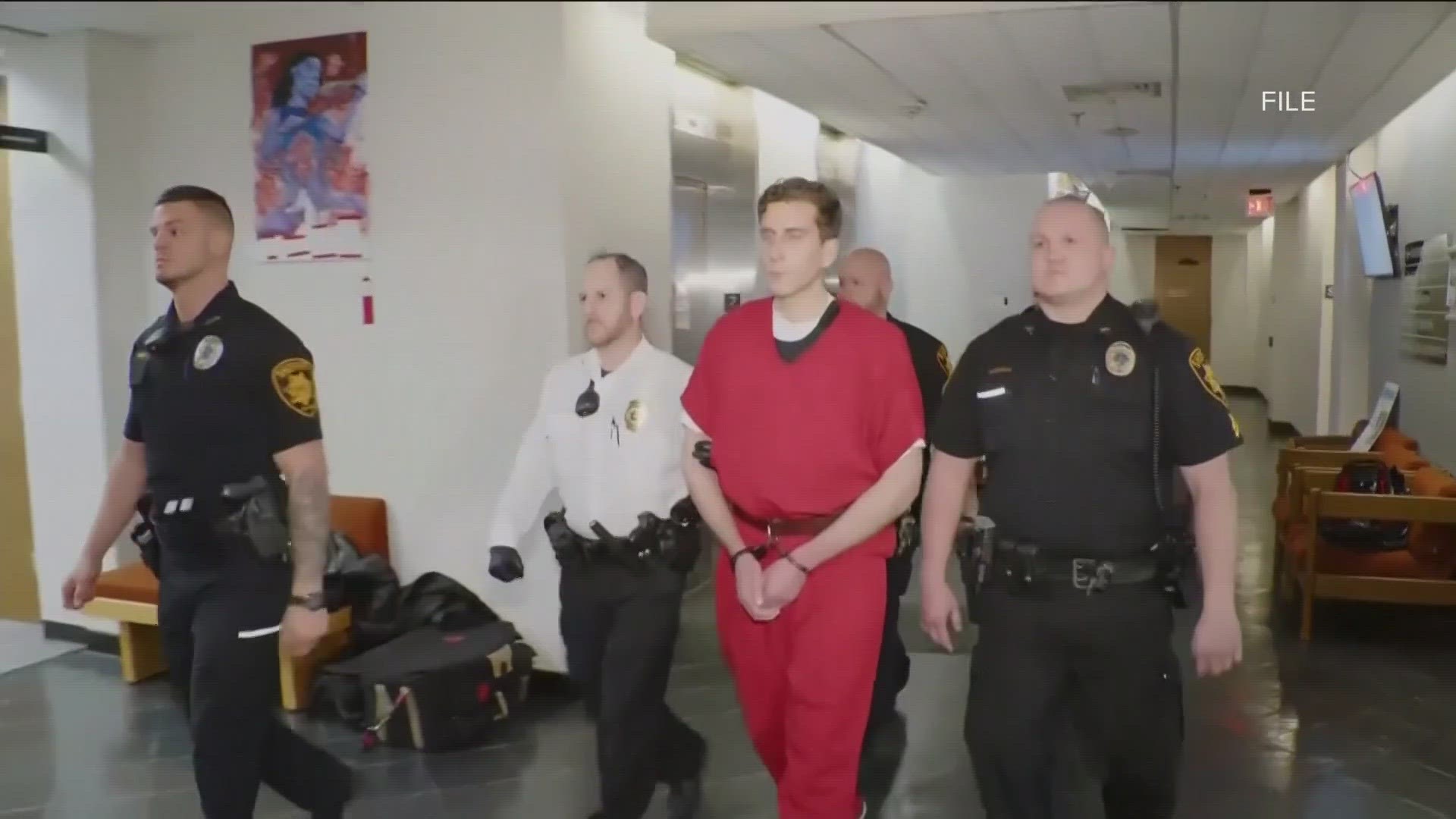MOSCOW, Idaho — The man accused of stabbing four University of Idaho students to death on Nov. 13, 2022, is a step closer to standing trial.
In an indictment filed in Tuesday in Second District Court, the Latah County grand jury accuses Kohberger of four counts of first-degree murder and one count of burglary. Under Idaho law, burglary is defined as entering a house, room, apartment, business or any other type of building or vehicle with intent to commit any felony.
The indictment is not a pronouncement of guilt; it's a statement of charges. Kohberger still has the right to trial by jury.
Kohberger is expected to answer the charges when he appears for arraignment in Latah County District Court on Monday, May 22, at 9 a.m. PDT/10 a.m. MDT. Judge John Judge is presiding over the case. A preliminary hearing previously scheduled to take place in magistrate court on June 26 is canceled.
Kohberger was arrested Dec. 30, 2022, at his family's home in Pennsylvania. Proceedings in Latah County Magistrate Court began the next week, after Pennsylvania State Police officers escorted him on a cross-country flight to Idaho.
A redacted version of the indictment was posted for the public Wednesday morning. At less than two-and-a-half pages, it's short for a court document. Here's a count-by-count look of what's in it:
- Count I, Burglary: This alleges that Kohberger unlawfully entered the house at 1122 King Road in Moscow with the intent to commit the felony crime of murder.
- Count II, Murder in the first degree: This alleges that Kohberger "willfully, unlawfully, with premeditation and with malice aforethought, killed and murdered Madison Mogen by stabbing.
- Count III, Murder in the first degree: Using similar language to count II, this alleges that Kohberger murdered Kaylee Goncalves.
- Count IV, Murder in the first degree: Using similar language to counts II and III, this alleges that Kohberger murdered Xana Kernodle.
- Count V, Murder in the first degree: Also using similar language to the other three murder counts, this alleges that Kohberger murdered Ethan Chapin.
The last sentence of the indictment refers to the allegations as being "contrary to the form, force, and effect of the statutes in such a case made and provided and against the peace and dignity of the State of Idaho."
The names of all witnesses examined by the grand jury in the Kohberger case are sealed. Latah County Prosecutor Bill Thompson explains why he believes those names should be sealed in this motion, which the judge granted. In that motion, Thompson wrote that prospective witnesses, or their families and associates, had already complained of being harassed in person and on social media. He argued that releasing their names would make that situation worse and undermine the integrity of the case.
The name of the presiding grand juror, who signed the indictment, is redacted from the document posted online (as a .pdf document). You can view it through this link or the window below.
Why the preliminary hearing was canceled; what a grand jury does
In felony cases, Idaho law requires the state — the prosecution — to show there is enough evidence to proceed to trial. That is done either through a preliminary hearing, where witness testimony is presented in open court and the defense has an opportunity to cross-examine those witnesses, or through grand jury proceedings. Preliminary hearings in Idaho felony criminal cases take place in magistrate court, which also handles the initial court appearance after an arrest. Trials and sentencings take place in district court, similar to what's called "superior court" in some other states.
A grand jury, as explained by staff with the Idaho Judicial Branch, is a panel of citizens called together to hear evidence in a serious criminal matter, then determine if charges should be brought against a person. The Administrative District Judge in a given county may order the impaneling of a grand jury on a motion from the prosecuting attorney, at "such times as the public interest requires," according to Idaho Criminal Rule 6.
Grand jury proceedings, including witness testimony, are private and secret. Prosecutors present the information to the grand jury. Possible defendants are not entitled to be there, and there's no opportunity for anyone to cross-examine witnesses on the defendant's behalf.
Under Idaho Criminal Rules, a grand jury may consist of 16 people, but the grand jury may deliberate and take action if at least 12 people are present. Selection and impaneling of grand jurors takes place in a closed session, with only a district judge, prosecutors, the prospective jurors, the court reporter, a court clerk and, if needed, an interpreter present.
If the grand jury determines criminal proceedings should be initiated, as it has done in Kohberger's case, it returns an indictment. Based on the indictment, the court summons the defendant to appear in district court for an arraignment.
In that arraignment on Monday, the charges will be read and Kohberger may enter a plea of guilty or not guilty; another possibility is that he will stand silent, in which case the judge will enter a plea of "not guilty." It's also possible that the entry of plea may be set for a later date. If Kohberger pleads not guilty, preparations for trial will continue. If he pleads guilty, the case will move to the sentencing phase.
First-degree murder carries a possible death sentence; short of that, Kohberger could be sentenced to prison for the rest of his life. According to Idaho law, prosecutors who intend to seek the death penalty must file a written notice no later than 60 days after a plea is entered. If prosecutors seek the death penalty and Kohberger is found guilty, the judge may sentence him to death only if a jury recommends it.
Watch more coverage of this story
Ongoing coverage of the University of Idaho investigation can be found in our YouTube playlist:

